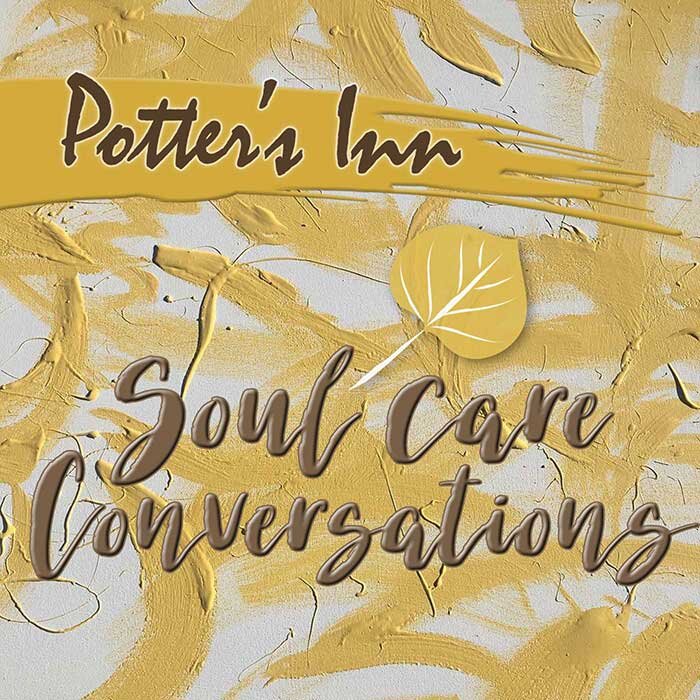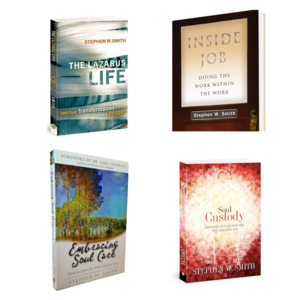We are on #4 of our Top Ten List. This one is from the very beginning - our 2nd episode! It’s an excellent “primer” on what Soul Care really is and ends with what has become a favorite poem of mine - For One Who Is Exhausted by John O’Donohue, which if you remember was also a poem from last week’s episode. It’s so relatable! And so timely in the days we live in.
The podcast Show Notes (below) mention a few suggested books that have been on my reading list for a while. I just started to read Conjectures of a Guilty Bystander by Thomas Merton, and have been surprised at how relevant his writings are in our world today. Despite being cloistered for over 25 years, he still understands what many of us struggle while being “…in the world.”
“To allow oneself to be carried away by a multitude of conflicting concerns, to surrender oneself to too many demands, to commit oneself to too many projects, to want to help everyone in everything is to succumb to violence. More than that, it is cooperation in violence. It destroys one’s own capacity for peace. It destroys the fruitfulness of one’s own work, because it kills the root of inner wisdom which makes the work fruitful.”
This quote reminds me of another book I read a long time ago. At the time I didn’t realize it would be my first introduction to Soul Care. It was called “Let Your Life Speak” by Parker J. Palmer.
I was working in a church at the time and feeling pulled in hundreds of different directions - I was depressed, overwhelmed, and anxious. Then my counselor suggested I read this book, and for the first time I heard about self-care and not needing to be everything to everybody. It was ok for me to say no!
At the time, it felt like I was being so incredibly selfish to not be “doing” church 24x7 (and sadly, I was actually told that very thing as I tried to simplify my life). Yet how simple, and oh so difficult it is, to understand what it means to take care of ourselves… to take care of our SOULS.
“Eventually, I developed my own image of the “befriending” impulse behind my depression. Imagine that from early in my life, a friendly figure, standing a block away, was trying to get my attention by shouting my name, wanting to teach me some hard but healing truths about myself. But I— fearful of what I might hear or arrogantly trying to live without help or simply too busy with my ideas and ego and ethics to bother— ignored the shouts and walked away.
So this figure, still with friendly intent, came closer and shouted more loudly, but I kept walking. Ever closer it came, close enough to tap me on the shoulder, but I walked on. Frustrated by my unresponsiveness, the figure threw stones at my back, then struck me with a stick, still wanting simply to get my attention. But despite the pain, I kept walking away.
Over the years, the befriending intent of this figure never disappeared but became obscured by the frustration caused by my refusal to turn around. Since shouts and taps, stones and sticks had failed to do the trick, there was only one thing left: drop the nuclear bomb called depression on me, not with the intent to kill but as a last-ditch effort to get me to turn and ask the simple question, “What do you want?” When I was finally able to make the turn— and start to absorb and act on the self-knowledge that then became available to me— I began to get well.
The figure calling to me all those years was, I believe, what Thomas Merton calls “true self.” This is not the ego self that wants to inflate us (or deflate us, another from of self-distortion), not the intellectual self that wants to hover above the mess of life in clear but ungrounded ideas, not the ethical self that wants to live by some abstract moral code. It is the self-planted in us by the God who made us in God’s own image— the self that wants nothing more, or less, than for us to be who we were created to be.
True self is true friend. One ignores or rejects such friendship only at one’s peril.”
With Gratitude,
Pam
________________________________________________________
This is WEEK 7 of our summer series The Roaring Summer of ‘21 Series: The Best of the Best! We have gone back thru all 5 of our seasons and come up with 10 episodes that have been our most listened to and will be airing those episodes over the next 10 weeks.
Today is our 4th most popular podcast, and is one of our very first episodes (#2!) - What is Soul Care?
SHOW NOTES
Join co-hosts Steve Smith and Joe Chambers as they give more definition to what soul care is and how it relates to… icebergs and the Brooklyn Bridge? Yup, both of those! Steve shows us the stress caused by living divided lives and lays out the importance of caring for all aspects of the human experience: physical, emotional, relational, vocational, and spiritual.
LINKS AND RESOURCES MENTIONED IN THE PODCAST
Understanding the Soul (with Icebergs illustration): View and Download Here
Article: Five Reasons Soul Care Matters by Stephen W. Smith: View and Download Here
Poem: For One Who Is Exhausted by John O’Donohue. This poem is available in his book To Bless The Space Between Us: A Book of Blessings. Learn more about John O’Donohue at www.johnodonohue.com
BOOKS RECOMMENDED
CONTACT US
INTERESTED IN MORE SOUL CARE RESOURCES?
Check out our recommended reading, books on spiritual growth, and our soul care blog. Want to experience soul care in person? Learn more about our soul care intensives and retreats.






